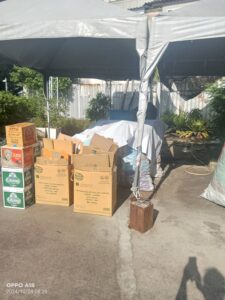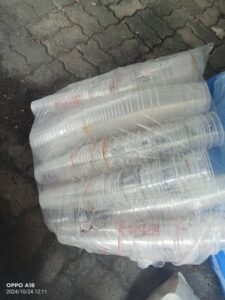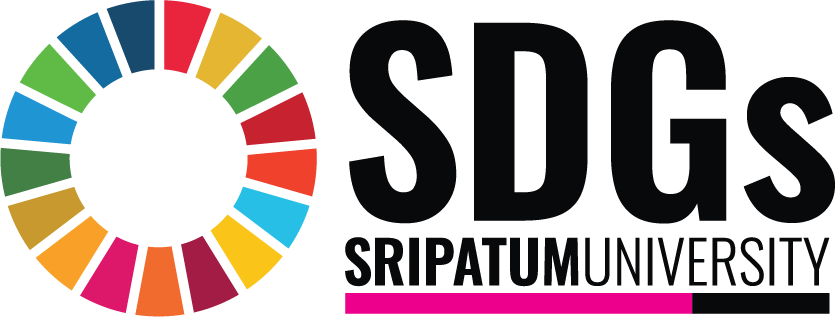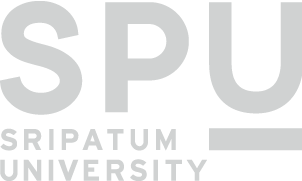


SPU Raises the Bar with High Recycling Rates and Circular Economy Model
Sripatum University boosts sustainability with a system that recycles over 8 tons of waste monthly — supporting climate action, clean operations, and job creation through its innovative Waste Bank.
Sripatum University (SPU) continues to lead Thailand’s higher education in sustainable waste management, with a focus on maximizing recycling efforts and minimizing environmental impact. In alignment with SDG 12: Responsible Consumption and Production, especially sub-goal 12.3.2, SPU tracks and increases the proportion of waste recycled monthly through structured waste segregation and reuse protocols.
According to its latest waste assessment report, SPU processes approximately 90 tons of general waste monthly, but successfully recycles 8 tons of materials — including paper, glass, plastic, and metals. Additionally, food waste from campus operations (800 liters/day) is directed toward composting and biomass conversion, reducing pressure on landfill systems and promoting sustainable resource reuse.
The Office of Buildings leads the program in collaboration with the Chatuchak District Office. Only unrecyclable waste is sent to disposal, while the Waste Bank — a key part of SPU’s model — collects, stores, and sells recyclables. This effort not only supports circular economy principles but also generates income for staff and creates microeconomic employment opportunities within the campus community.
Beyond environmental benefits, this initiative contributes to SDG 13: Climate Action. Recycling reduces carbon emissions by limiting the use of virgin raw materials and lowering waste-related methane generation. The university’s data-driven approach to waste categorization strengthens long-term tracking and system improvement.
By efficiently combining climate mitigation, education, and local economic support, SPU’s recycling system proves that sustainability is not just a policy — it’s an ecosystem of continuous progress and inclusive growth.
ข่าวในภาษาไทย | News in Thai
ม.ศรีปทุม ยกระดับการรีไซเคิลขยะ หนุนเศรษฐกิจหมุนเวียนและลดโลกร้อน
มหาวิทยาลัยศรีปทุมเดินหน้าจัดการขยะอย่างเป็นระบบ รีไซเคิลขยะกว่า 8 ตันต่อเดือน พร้อมเสริมรายได้ให้บุคลากรผ่าน “ธนาคารขยะ” ชูโมเดลเศรษฐกิจหมุนเวียนที่ยั่งยืน
มหาวิทยาลัยศรีปทุม (SPU) ยังคงเป็นแนวหน้าในด้านความยั่งยืนของสถาบันอุดมศึกษาไทย ด้วยระบบคัดแยกและรีไซเคิลขยะที่เข้มแข็ง โดยสอดคล้องกับ SDG 12: การบริโภคและการผลิตอย่างยั่งยืน โดยเฉพาะเป้าหมายย่อย 12.3.2 ที่เน้นการเพิ่มสัดส่วนของขยะที่นำไปรีไซเคิลอย่างต่อเนื่อง
จากรายงานประเมินผลล่าสุด มหาวิทยาลัยผลิตขยะทั่วไปประมาณ 90 ตันต่อเดือน แต่สามารถรีไซเคิลได้ถึง 8 ตันต่อเดือน ทั้งในรูปแบบกระดาษ ขวดแก้ว พลาสติก และโลหะ นอกจากนี้ ขยะอาหารจากกิจกรรมในมหาวิทยาลัยกว่า 800 ลิตรต่อวัน ยังถูกนำไปแปรรูปเป็นปุ๋ยอินทรีย์หรือเชื้อเพลิงชีวมวล ลดภาระการฝังกลบ และส่งเสริมการใช้ทรัพยากรอย่างยั่งยืน
โครงการอยู่ภายใต้การดูแลของสำนักงานอาคารสถานที่ ร่วมกับสำนักงานเขตจตุจักร โดยขยะที่สามารถใช้ใหม่ได้จะถูกคัดแยกและส่งเข้าระบบ “ธนาคารขยะ” ซึ่งเป็นกลไกสำคัญในการส่งเสริมเศรษฐกิจหมุนเวียน พร้อมสร้างรายได้เสริมให้กับบุคลากรในมหาวิทยาลัย และเพิ่มการจ้างงานขนาดย่อมภายในชุมชน
โครงการนี้ยังเชื่อมโยงกับ SDG 13: การรับมือการเปลี่ยนแปลงสภาพภูมิอากาศ โดยการรีไซเคิลช่วยลดการใช้วัตถุดิบใหม่ ลดการปล่อยก๊าซเรือนกระจก และจำกัดการผลิตก๊าซมีเทนจากขยะอินทรีย์ ทั้งยังใช้ข้อมูลสถิติอย่างเป็นระบบเพื่อพัฒนาระบบต่อเนื่อง
ด้วยการผสานด้านสิ่งแวดล้อม เศรษฐกิจ และการบริหารจัดการอย่างรอบด้าน SPU แสดงให้เห็นว่า “ความยั่งยืน” คือระบบนิเวศที่เติบโตได้จริง หากมีนโยบายชัดเจน และความร่วมมือที่ต่อเนื่องจากทุกภาคส่วน


